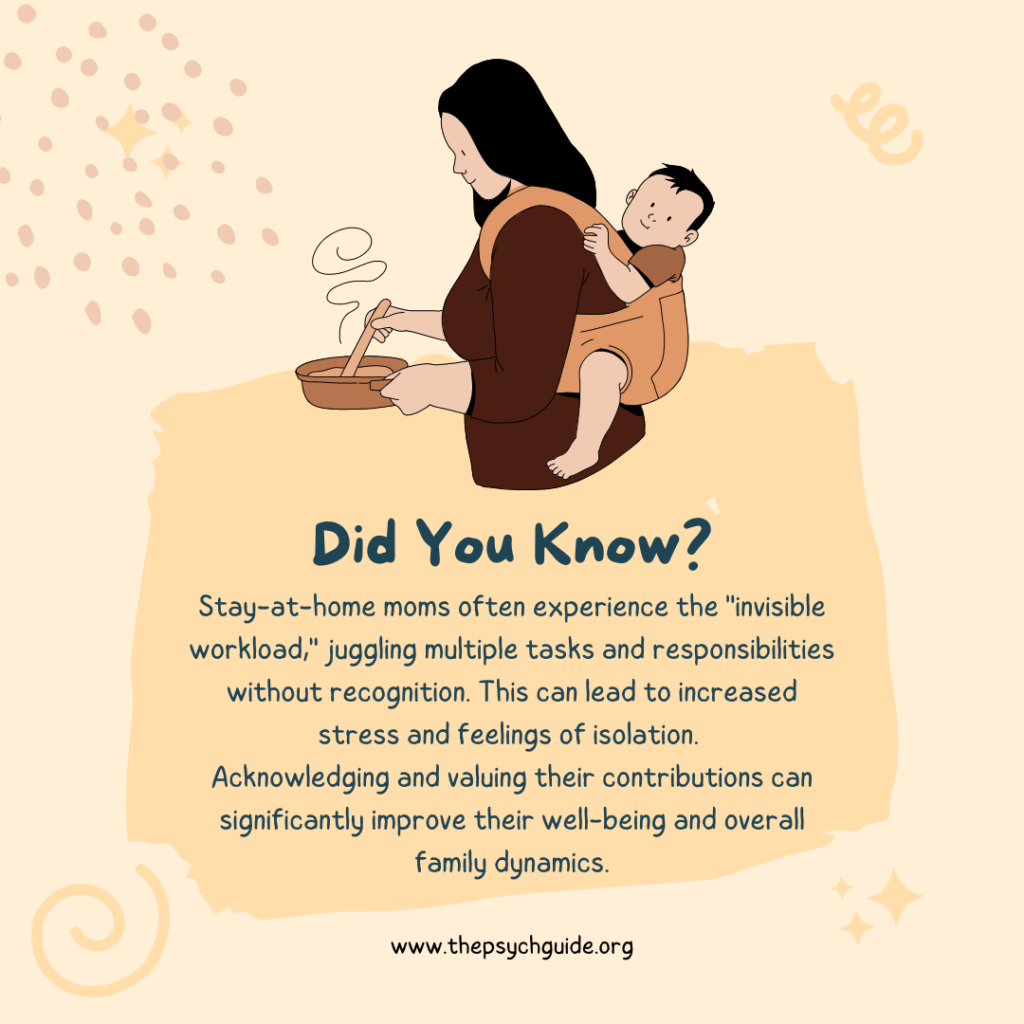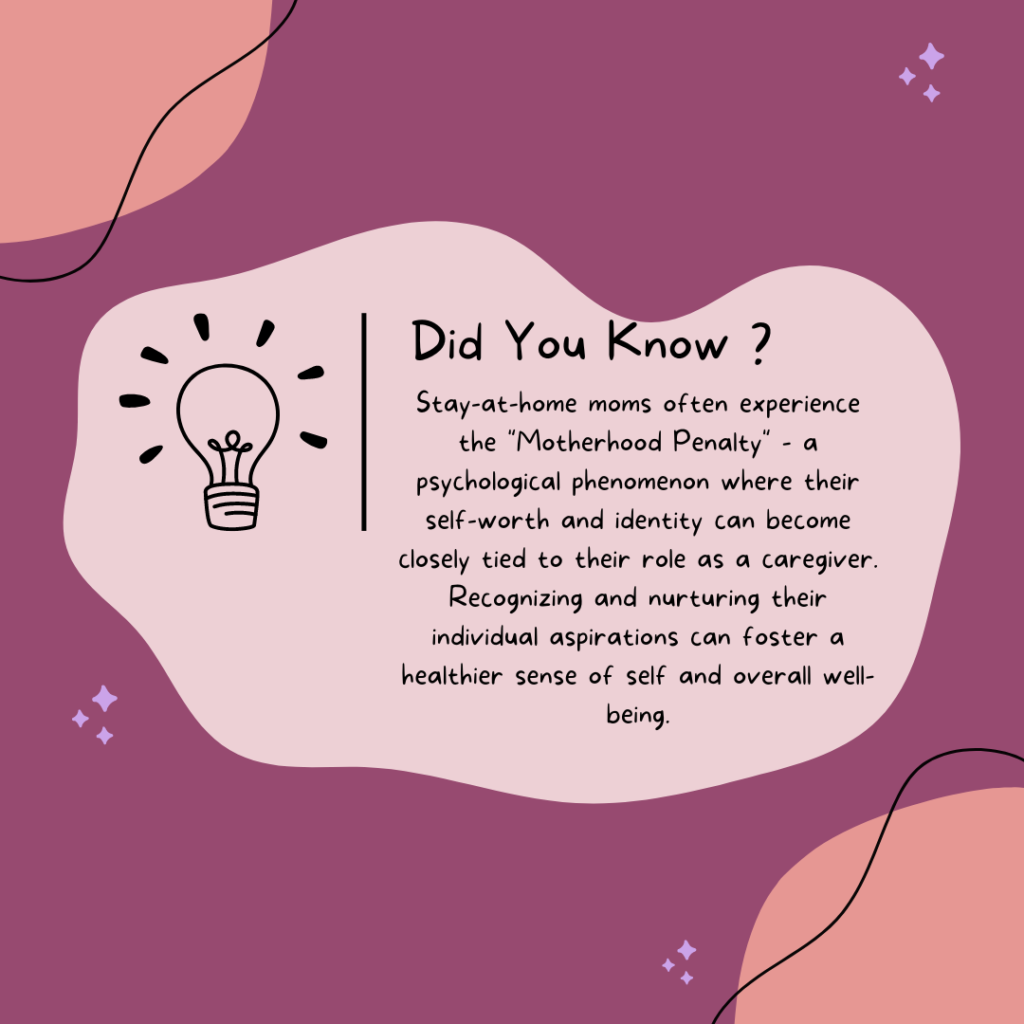Both joys and difficulties are part of becoming a mother. Many parents who decide to stay at home with their kids may face emotions of loneliness, identity loss, and depressive-like sadness.
It is important to identify and understand the symptoms of stay-at-home mom depression. While being a stay-at-home mom can be a fulfilling and joyful role, it is not without its challenges. The demands of caregiving, isolation from adult interactions, and the absence of a structured work environment can contribute to feelings of depression. By identifying these symptoms, we can shed light on this important topic and provide support for those who may be experiencing these difficulties.
Table of Contents
ToggleQuick Overview.
Let’s unveil the symptoms of stay-at-home mom depression.
- Persistent sadness or low mood.
- Loss of interest or pleasure in activities.
- Changes in appetite or weight.
- Sleep disturbances.
- Fatigue or loss of energy.
- Feelings of worthlessness or excessive guilt.
- Difficulty concentrating or making decisions.
- Restlessness or slowed movements.
- Social withdrawal.
- Irritability or agitation.
- Loss of self-identity.
- Feelings of overwhelm.
- Negative self-talk.
- Difficulty experiencing pleasure in parenting.
- Changes in personal hygiene or appearance.
- Feelings of loneliness or isolation.
- An increased sensitivity or emotional reactivity.
- Loss of interest in personal appearance or activities.
Depth analysis of Symptoms of Stay-at-home Mom Depression.
Change in appetite:
Being a stay-at-home mom with depression you might find yourself losing interest in food and struggling to maintain a healthy appetite. Also, you will find it difficult to enjoy meals or may forget to eat altogether. On the other hand, another stay-at-home mom might experience emotional eating as a way to cope with feelings of sadness or stress and tries to seek comfort in unhealthy snacks like cookies or chips.
Difficulty sleeping or needing more sleep:
Another symptom is trouble falling asleep at night due to racing thoughts or feelings of anxiety. Even when your children allow you the opportunity to rest during the day, you find yourself unable to sleep and feel overwhelmed by worry, sadness, and the weight of your responsibilities.
Loss of energy and motivation:
It is quite a common symptom that causes waking up feeling tired and lacking the motivation to do daily tasks. Simple activities that you used to enjoy, such as playing with children or engaging in hobbies, may feel like carrying mountains on your shoulders. Being a stay-at-home mom with depression you will feel constantly drained and will find it difficult to gather the energy to engage in once-fulfilling activities.
Feeling overwhelmed:
Being a stay-at-home mom you will feel overwhelmed by the demands of motherhood and household responsibilities. The struggle to keep up with the constant needs of your children, the never-ending laundry, and the never-clean-enough house makes you frustrated. This sense of being overwhelmed can lead to feelings of stress, helplessness, and inadequacy, contributing to your depressive symptoms.
Mom guilt:
A stay-at-home mom experiencing depression may feel guilty whenever she prioritizes her own needs or self-care. She may feel selfish for taking time for herself or pursuing activities that bring her joy, leading to a cycle of self-neglect and worsening depressive symptoms. This guilt can create internal conflict and make it harder for her to seek help or support.
Burnout:
While experiencing chronic stress and overwhelming responsibilities may reach a point of burnout. She may feel emotionally detached, finding it hard to engage with her children or feel joy in her role as a mother. She may become easily distracted, experience feelings of numbness, and develop a cynical or apathetic outlook on life.
Regretting having kids:
A stay-at-home mom with depression might find herself questioning her decision to have children. She may have moments of deep regret or doubt, feeling overwhelmed by the responsibilities of motherhood. While these thoughts may be fleeting and normal in some instances, if they persist and significantly impact her well-being, they may be indicative of depression.
Mom rage:
You may struggle with controlling your emotions, leading to outbursts of anger, irritability, or yelling. you feel frustrated by the demands placed on you and find it difficult to manage your stress, resulting in moments of mom rage. These outbursts may leave you feeling guilty and worsen your depressive symptoms.
Thoughts of death or harm:
In severe cases of depression, a stay-at-home mom may experience thoughts of death, self-harm, or harm toward her children. These thoughts can be alarming and indicate a need for immediate professional help to ensure her safety and well-being.

Self-help strategies to cope with Symptoms of Stay-at-home Mom Depression.
Coping Strategies for Stay-at-Home Mom Depression.
Seek social support
Reach out to friends, family, or support groups to share experiences and feelings.
Establish a daily routine
Create structure and a sense of accomplishment by setting and following a daily schedule.
Prioritize self-care
Make time for activities that promote self-care, such as exercise, hobbies, relaxation, and personal interests.
Set realistic expectations
Avoid putting excessive pressure on yourself and accept that you cannot do everything perfectly.
Practice mindfulness or meditation
Engage in activities that promote present-moment awareness and relaxation, such as meditation or deep breathing.
Seek professional help
Consult a mental health professional for therapy or counseling to address and manage depression symptoms.
Engage in regular physical exercise
Participate in physical activities that boost mood and increase energy levels, such as walking, yoga, or dancing.
Take breaks and practice self-care during the day.
Allow yourself breaks throughout the day to recharge and engage in activities that bring you joy or relaxation.
Delegate and ask for help.
Reach out to your partner, family members, or friends for assistance with childcare or household tasks.
Engage in creative outlets.
Explore creative activities like painting, writing, or crafting, which can serve as outlets for self-expression.
Practice positive self-talk.
Challenge negative thoughts and replace them with positive affirmations and self-compassion.
Engage in hobbies or interests outside of parenting.
Practice stress-reducing techniques
Use relaxation techniques like deep breathing, journaling, or listening to calming music to manage stress and anxiety.

Causes of stay-at-home mom depression.
Causes of stay-at-home mom depression can vary from person to person, but here are some common factors that can contribute to this condition:
Social isolation:
Being a stay-at-home mom can sometimes lead to feelings of isolation and loneliness, especially if there is limited communication with other adults regularly. Lack of adult conversation and social support can impact mental well-being.
Loss of identity and purpose:
Some stay-at-home moms may experience a sense of loss or a diminished sense of identity and purpose outside of their role as a caregiver. This loss of personal fulfillment or satisfaction can contribute to feelings of depression.
Lack of autonomy and control:
The daily responsibilities and demands of being a stay-at-home mom can sometimes lead to a loss of freedom and control over one’s time and choices. This loss of personal freedom can contribute to feelings of frustration, helplessness, and depression.
Financial stress:
For some stay-at-home moms, the decision to leave the workforce may come with financial challenges or dependency on a partner’s income. Financial stress and worries about financial stability can impact mental well-being.
Unrealistic societal expectations:
Society often places unrealistic expectations on stay-at-home moms to be perfect caregivers, keep an immaculate home, and manage all household tasks flawlessly. The pressure to meet these expectations can contribute to feelings of inadequacy and depression.
Lack of self-care:
Stay-at-home moms often prioritize the needs of their children and family above their own. Neglecting self-care activities, such as exercise, hobbies, or personal time, can negatively impact mental well-being.
Limited external validation:
Stay-at-home moms may experience a lack of external validation or recognition for their work. The absence of feedback or acknowledgment from colleagues or supervisors, as experienced in the workplace, can contribute to feelings of self-doubt and depression.
Treatment for stay-at-home mom depression.
Here are the treatment options for stay-at-home mom depression:
Therapy:
Cognitive-behavioral therapy (CBT) or other forms of psychotherapy.
Medications: Antidepressant medications prescribed by a healthcare professional.
Support groups: Joining support groups for stay-at-home moms or postpartum depression.
Lifestyle changes: Improving sleep patterns, engaging in regular exercise, adopting a balanced diet, and practicing stress-reduction techniques.
Social support: Building a strong support network through family, friends, or other stay-at-home moms.
Self-care practices: Prioritizing activities that bring joy, relaxation, and personal fulfillment.
Collaboration with a partner: Open communication and sharing responsibilities with one’s partner.
Seeking help: Consulting with healthcare professionals, therapists, counselors, or psychiatrists for personalized treatment recommendations.
Case study.
Personal History:
Mrs. L.A has been a stay-at-home mom for the past four years. Worked as a graphic designer before becoming a caretaker of her children. After the birth of her first child, she left her job so that she could devote her time and energy to bringing up her kids. At first, things felt enthusiastic about being able to see her children grow and provide them with a nurturing environment. Nonetheless, after a few months, she began to encounter a drop in her mental health.
Complaints:
She felt persistently sad and lost interest in activities she used to enjoy and felt weighed down by reading, cooking, and spending time with her children.
She felt alone due to concentrating on childcare and house chores, with limited interaction with other adults of her age. It was hard for her to search for support, which worsened her loneliness.
She did undergo an identity crisis, feeling lost and no longer ambitious. Seeking personal interests brought guilt and worthlessness. She felt trapped in the role of a stay-at-home mom.
Managing childcare, chores, and poor sleep left her physically and mentally drained. Exhaustion impeded her ability to engage in activities and take care of herself, leading to frustration and despair.
Anxiety and self-doubt disturbed her as she aimed for perfection, comparing herself to others and succumbing to societal expectations, which deepened her depressive symptoms.
Family History:
Mrs. L.A’s family has a history of mental health issues. Her mother and sister both have a diagnosis of depression. This family history has made Mrs. L.A more aware of the potential risk factors and the importance of early intervention.
Social History:
As a stay-at-home mom, Mrs. L.A’s social interactions became limited because of her family. She found herself cut off and lacking grown-up friendship.
Additionally, the demands of childcare left little time for personal hobbies or socializing with friends. The absence of a support network further compounded her feelings of isolation.
Past Medical History:
Mrs. L.A had a history of anxiety and had previously sought therapy to manage her symptoms. However, she had not experienced depression before becoming a stay-at-home mom. The transition from a professional career to full-time caregiving, coupled with the added stressors of parenting, likely contributed to the onset of her depressive symptoms.
Psychiatric History:
Mrs. L.A.’s depressive episode was marked by a lack of interest in previously enjoyed activities, low energy, impatience, and persistent emotions of sadness. She had trouble focusing, sleeping, had body aches, and frequently felt overburdened by her daily obligations. Over time, these symptoms grew worse, affecting her functioning and straining her relationships.
Seeking Help and Therapy Sessions:
Mrs. L.A. requested assistance from a mental health specialist after realizing the depth of her situation. She was given the diagnosis of stay-at-home mom depression following a careful investigation. Her therapy sessions with a qualified therapist helped her explore her emotions, create coping mechanisms, and recover her self-esteem and sense of self.
A total of sixteen weeks were spent with Mrs. L.A. attending weekly therapy sessions. She went to sixteen therapy sessions, which allowed her to process her feelings, build coping skills, and eventually enhance her mental health.
She joined neighborhood parenting groups, participated in internet discussion forums, and went to support sessions designed especially for mothers dealing with similar issues, meeting others who could relate to her challenges.
With consistent therapy, and a supportive network, Mrs. L.A gradually experienced improvements in her mental health. She started to regain her sense of self and found a balance between being a dedicated mother and nurturing her interests. Although challenges persisted, she developed healthy coping mechanisms to manage her symptoms effectively.
FAQS
How does the mental health of stay-at-home mothers affect them?
According to Wright, stay-at-home mothers are susceptible to anxiety or despair. Although there are few studies on the subject, a Gallup survey of more than 60,000 American women indicated that stay-at-home mothers were more likely than working mothers to go through despair, depression, anxiety, and rage.
What challenges does a stay-at-home mother face?
Stay-at-home mothers are more likely to have physical health issues, anxiety, and despair, according to recent studies. If you’re not cautious about what you eat, how much you exercise, or how often you take care of yourself, it can be difficult to maintain your health as a stay-at-home parent.
How long should a mom keep herself at home?
While some mothers return to work just a few weeks after giving birth, others may take up to a year (or more) off. Although every experience is unique, most postpartum symptoms commonly subside after six weeks of childbirth.
Do parents who remain at home feel lonely?
You’re not alone if you suffer from stay-at-home mom depression.
Another thing that hasn’t changed is the occasionally experienced sense of purposelessness, loneliness, and isolation that comes with being a full-time caretaker. More than 25% of parents who don’t work are afflicted by the syndrome known as stay-at-home mom depression.
Conclusion.
Recognizing the detailed symptoms of depression in stay-at-home moms is crucial for providing appropriate support and intervention. By understanding these symptoms, we can help individuals identify their struggles, seek professional help, and implement strategies for self-care and well-being. If you or someone you know is experiencing these symptoms, reaching out to a healthcare professional is essential for a comprehensive assessment and tailored treatment plan. Remember, seeking help is a sign of strength, and support is available to assist stay-at-home moms in overcoming depression and regaining a sense of joy and fulfillment in their role.

